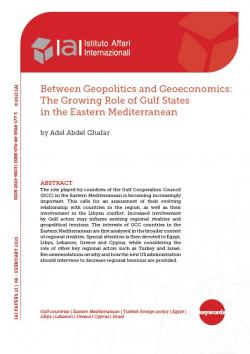Between Geopolitics and Geoeconomics: The Growing Role of Gulf States in the Eastern Mediterranean
The role played by countries of the Gulf Cooperation Council (GCC) in the Eastern Mediterranean is becoming increasingly important. This calls for an assessment of their evolving relationship with countries in the region, as well as their involvement in the Libyan conflict. Increased involvement by Gulf actors may inflame existing regional rivalries and geopolitical tensions. The interests of GCC countries in the Eastern Mediterranean are first analysed in the broader context of regional rivalries. Special attention is then devoted to Egypt, Libya, Lebanon, Greece and Cyprus, while considering the role of other key regional actors such as Turkey and Israel. Recommendations on why and how the new US administration should intervene to decrease regional tensions are provided.
Paper prepared in the framework of the IAI-Eni Strategic Partnership, January 2021.
-
Details
Rome, IAI, February 2021, 25 p. -
In:
-
Issue
21|06 -
ISBN/ISSN/DOI:
978-88-9368-177-3
Introduction
1. The Gulf’s moment? The strategic priorities of the Arab Gulf states
1.1 Saudi Arabia
1.2 The UAE
1.3 Qatar
1.4 Gulf countries’ relations with Israel
2. Turkish ambitions and growing tensions in the Eastern Mediterranean
3. Analysing the role of Gulf states in the Eastern Mediterranean
3.1 Libya
3.2 Egypt
3.3 Lebanon
3.4 Greece and Cyprus
Conclusion
References
Topic
Tag
Related content
-
Ricerca02/11/2018
IAI-Eni Strategic Partnership
leggi tutto



